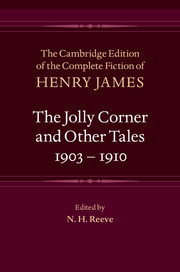Book contents
- Frontmatter
- Contents
- Acknowledgements
- List of Abbreviations
- General Editors’ Preface
- General Chronology of James’s Life and Writings
- Introduction
- Textual Introduction
- Chronology of Composition and Production
- Bibliography
- The Jolly Corner and Other Tales 1903–1910
- Glossary of Foreign Words and Phrases
- Notes
- Textual Variants
- Emendations
- Appendices
General Editors’ Preface
Published online by Cambridge University Press: 11 April 2021
- Frontmatter
- Contents
- Acknowledgements
- List of Abbreviations
- General Editors’ Preface
- General Chronology of James’s Life and Writings
- Introduction
- Textual Introduction
- Chronology of Composition and Production
- Bibliography
- The Jolly Corner and Other Tales 1903–1910
- Glossary of Foreign Words and Phrases
- Notes
- Textual Variants
- Emendations
- Appendices
Summary
The Cambridge Edition of the Complete Fiction of Henry James (hereafter CFHJ) has been undertaken in the belief that there is a need for a full scholarly, informative, historical edition of his work, presenting the texts in carefully checked, accurate form, with detailed annotation and extensive introductions. James's texts exist in a number of forms, including manuscripts (though most are lost), serial texts and volumes of various sorts, often incorporating significant amounts of revision, most conspicuously the so-called New York Edition (hereafter NYE) published by Charles Scribner's Sons in New York and Macmillan and Co. in London (1907–9). Besides these there are also pirated editions, unfinished works published posthumously and other questionable forms. The CFHJ takes account of these complexities, within the framework of a textual policy which aims to be clear, orderly and consistent.
This edition aims to represent James's fictional career as it evolves, with a fresh and expanded sense of its changing contexts and an informed sense of his developing style, technique and concerns. Consequently it does not attempt to base its choices on the principle of the ‘last lifetime edition’, which in the case of Henry James is monumentally embodied in the twenty-four volumes of the NYE, the author's selection of nine longer novels (six of them in two volumes) and fifty-eight shorter novels and tales, and including eighteen specially composed Prefaces. The CFHJ, as a general rule, adopts rather the text of the first published book edition of a work, unless the intrinsic particularities and the publishing history of that work require an alternative choice, on the ground that emphasis on the first context in which it was written and read will permit an unprecedented fullness of attention to the transformations in James's writing over five decades, as well as the rich literary and social contexts of their original publication.
There are inevitably cases where determining ‘the first published book edition’ requires some care. If, for instance, James expresses a preference for the text of one particular early book edition over another, or if the first edition to be published is demonstrably inferior to a later impression or edition, or if authorial supervision of a particular early edition or impression can be established, then a case can be made for choosing a text other than the first published book edition.
- Type
- Chapter
- Information
- The Jolly Corner and Other Tales, 1903–1910 , pp. xiii - xxPublisher: Cambridge University PressPrint publication year: 2017

